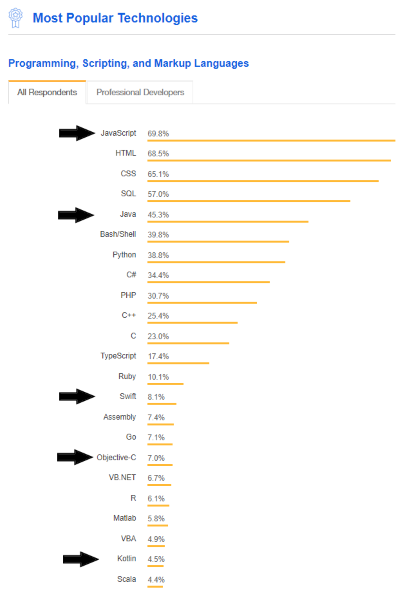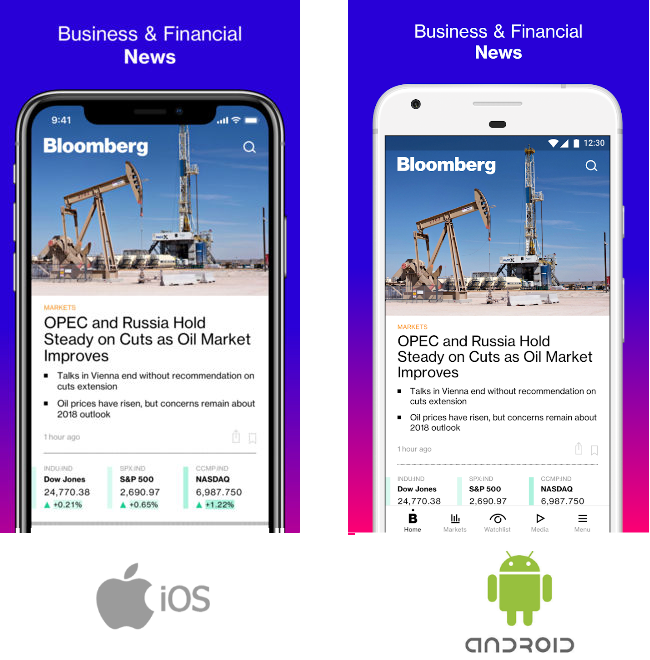The mobile app development area has quite changed recently with the advent of what we call “hybrid” apps. The main characteristic of these types of apps is that they use the technologies that web developers already know (such as HTML, CSS, JavaScript…) to build an app that will be compatible on both the Android and the iOS platforms.
But the main issue with these apps is that they are not necessarily as powerful as the native apps written with the “classic ” Android and iOS SDKs and that they won’t necessarily give you access to more advanced functions of the phone such as the camera, the GPS or the sensors. But React Native solves all of those issues by offering the developers to build “native” apps on both the iOS and Android platforms with only one shared JavaScript codebase, which improves the performance and gives you access to more advanced functions of the phone.
Let’s see what other benefits React Native will bring you.
1) You’re going to save money
The main advantage of React Native is its code re-usability. Though you have the opportunity to write code for specific platforms if you need to, React Native allows you to have only one shared code base in JavaScript that can be used to build your Android and iOS apps.
This can save you a lot of development time as having an app that is compatible with both Android and iOS usually requires you to have two different code bases, which takes twice the time. And, especially in the software development area, saving time means saving money on cost of development.
2) You won’t fight too long to find a developer
Another great advantage of React Native is that it uses the JavaScript programming language and that it is based on the pre-existing React framework. The latest Stack Overflow Developer Survey has shown that, as of today, the most popular programming language among developers is JavaScript with a popularity of 69.8%, while the “usual” programming languages used for Mobile development (Java & Kotlin for Android Development, Objective-C & Swift for iOS development) are mostly at the bottom of the survey with 45.3% for Java, 4.5% for Kotlin, 8.1% for Swift and 7.0% for Objective-C.

Stack Overflow Developer Survey 2018
The fact that React Native is based on a popular programming language and a popular framework means that developers who are familiar with these technologies will be able to learn and start working with it quickly. So if you already have a JavaScript developer in your team, it won’t take too long for him or her to switch to this technology. And even if you don’t, it won’t take you too long to find the right developer.
3) There’s a huge community behind
If there’s one thing that is really incredible with JavaScript and React Native, it is their communities. As these technologies are widely used around the world, many developers have probably already faced the issues that you might be facing during the development of your app. So if your developers are stuck on a specific problem, they’ll almost certainly be able to find guidance on websites such as StackOverflow or GitHub.
Furthermore, the fact that React Native uses JavaScript means that it gives your developers access to the npm package manager, which is the world’s largest software registry that consists of more than 650 000 packages of reusable code that can be used to develop your app more quickly.
4) Tech giants are already using it
Many apps that you probably use regularly are already using React Native. For example, the Airbnb, Instagram, Uber Eats apps are partly written with React Native. Bloomberg developers have even made the choice to completely redesign their app with React Native:
We found that React Native was the best tool available in the market today to create native apps simultaneously for both iOS and Android platforms

Comparison of the Bloomberg app on iOS and Android
The fact that industry giants have confidence in using this technology is a pretty good sign that it is ready for production and that it should subsist in the future.
Conclusion
I would highly recommend you to use React Native for your next mobile app project, especially if you’re a startup or a company that needs to launch its next product quickly. The main exception to this is if you want to build an app that needs a lot of computing power (such as a game or a simulation program), or an app that uses really advanced functions of the Android or iOS platforms.